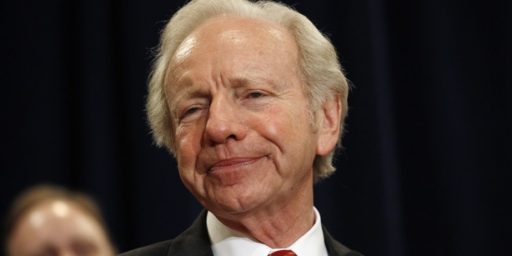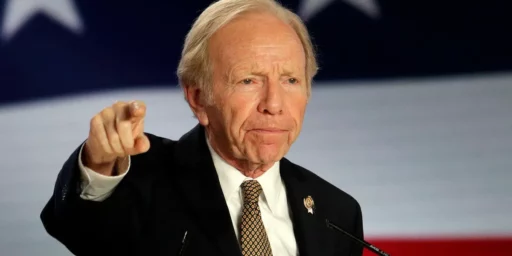DEAN ROUNDUP
RealClear Politics features a bevy of articles on the surprise frontrunner for the Democratic nomination.
George Will quotes Indiana Senator Evan Bayh,
At a meeting of the centrist Democratic Leadership Council, Bayh asked fellow Democrats, “Do we want to vent or do we want to govern?”
To quote Deion Sanders, Both.
Dean, who believes that extremism in denunciation of George W. Bush and all his works is no vice, has made himself the vehicle for venting by Democratic activists. They comprise the big bleeding liberal heart of the party’s nominating electorate, whose detestation of Bush is a witch’s brew of hatred and condescension.
Its three main ingredients are lingering resentment about Florida (they believe the U.S. Supreme Court should not have settled the 2000 election; that Florida’s Supreme Court should have) [Heh. -ed.], fury about Bush policies from tax cuts to war and, most important, a visceral, almost aesthetic recoil from Bush’s persona — his Texasness, the way he walks, the way he talks. They would not like the way he wears his hat or sips his tea, if he did such things.
But maybe venting could lead to winning,
Some in the White House believe that true independents — those whose votes really are up for grabs, as distinguished from those who call themselves independents but almost always vote one way — are only about 7 percent of the electorate. [Source for this figure? I’ve never seen this before. -ed.]
If so, the 2004 election, even more than most elections, will turn on the parties’ abilities to turn out their committed supporters. And some in the White House are beginning to worry about Dean because he understands that venting may be a practical precursor to governing: Venting energizes the party’s base.
Bob Novak takes this even a step further,
Dean’s campaign is a remorseless assault on George W. Bush, far exceeding his opponents’. Humorless and unsmiling, the country doctor with upper-class roots pummels the president. He has tapped into pure hatred by rank-and-file Democrats of the reigning Republican that I have never seen in 44 years of campaign watching. Not Richard Nixon, Ronald Reagan or even Bill Clinton generated such animosity.
And Novak knows angry.
Dean is actually in the mainstream of the party, with all candidates enunciating the same liberal line. Although Lieberman calls himself a centrist, his liberal rating in the Senate last year was measured by Americans for Democratic Action at 85 percent (actually higher than the 80 percent for Iowa’s supposedly ultra-liberal Tom Harkin).
What makes Dean so distasteful to his Democratic detractors is that he is not part of the establishment and unlikely ever to become part of it. The native New Yorker has become a flinty Vermonter, looking a little like a Calvin Coolidge of the left.
But how to stop him from being nominated?
Former Clinton (and current) Lieberman pollster Mark Penn predicts Dean would lose 49 of 50 states to Bush, while a former Clinton colleague (unwilling to be quoted by name) told me: ”Mark is wrong. Dean would only lose 40 states.” This ”he can’t win” argument did not stop Barry Goldwater, George McGovern, Ronald Reagan or Jimmy Carter from being nominated, and the last two actually were elected. The party faithful liked the purity of those candidates and did not care about electability, and the same might be proved true of the Anti-Bush.
Of course, this begs an age old-question that plagues two party systems: What’s the point of winning the election if your candidate doesn’t stand for anything? While candidates from the extreme wings of either party are unelectable, the most moderate candidates are no fun.
Donald Lambro says that, while Dean portrays himself as a fiscal conservative, he is actually responsible for massive tax increases in Vermont:
After 11 years under Mr. Dean’s governorship, Vermont now ranks in the top tier of high-tax states, a fiscal legacy that President Bush’s campaign strategists say they intend to highlight should Mr. Dean become the Democratic presidential nominee next year.
But everyone knows Vermont is a high tax state. On the other hand, they have a reputation for good schools and infrastructure, so at least get something for their money.
Lambro also points to Vermont’s atypical demographics:
Once known for its Yankee thrift, the state has become a mecca for affluent liberals from neighboring New York. Vermont’s sole congressman, independent Rep. Bernard Sanders, is an avowed socialist.
“Roughly 20 percent of the population does not depend upon jobs for income, people who are trust funders or independently wealthy,” says Michael Quaid, executive director of Vermonters For Tax Reform.
Tiny, bucolic Vermont, with a population of 610,000 — about the size of Austin, Texas — does not many of the problems of other states. More than 96 percent of Vermont residents are white; only 3.8 percent are immigrants. The unemployment rate is barely 4 percent.
The birth rate is the lowest in the nation, which means Vermont requires less spending on education and welfare than other states. With a median age of 37.7, the population is the third oldest among the states, and its under-18 population (24.2 percent) ranks as the eighth smallest.
While one might fairly use this to show that Dean doesn’t have experience dealing with problems that plague poorer, more ethnically diverse areas, it is unclear why one would blame–if that’s the right word–Dean for any of that.
George Weeks apparently was facing a deadline and had nothing to write, so he copied down a bunch of poll numbers. Don’t bother reading that one.
Update (1337): Kevin Drum has some thoughts on the George Will piece and the electability quandry. He cites another post by Matthew Yglesias on the topic.





